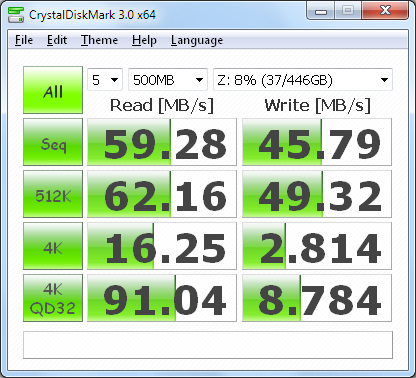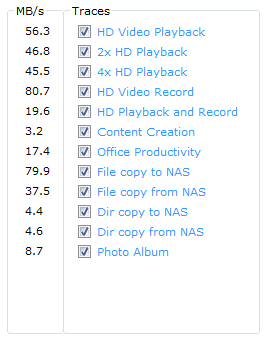The test system used in this review was an HP dc7900. The computer came equipped with an Intel Core 2 Duo E8400 3.0GHz CPU, 2GB of DDR2 800MHz memory, Seagate Barracuda 7200.10 ST3250310AS 250GB SATA hard drive, NVIDIA Quadro FX570 256MB PCIe graphics card and Intel 82567LM-3 gigabit network card. For the operating system, I installed a fresh copy of Windows 7 Enterprise.
To test the performance of the ASUS TS mini, I ran a series of benchmarks using CrystalDiskMark 3.0, ATTO Disk Benchmark 2.46, Iometer and the Intel NAS Performance Toolkit. The tests were first run with the device configured as an NAS and then again in its external hard drive mode. To eliminate any network bottlenecks, the TS mini was connected directly to the computer using a CAT6 ethernet cable.
CrystalDiskMark 3.0:
First, I ran a few quick tests using CrystalDiskMark. This benchmark tool measures the performance of a storage device by testing its sequential read and write speeds as well as its random read and write speeds using blocks 4KB and 512KB in size.

ASUS doesn't really say what kind of speeds the TS mini is capable of. Using CrystalDiskMark we can see that the server reached sequential read and write speeds of 59 MB/s and 45 MB/s, respectively.
ATTO Disk Benchmark 2.34:
I also used ATTO Disk Benchmark to test the TS mini's sequential read and write speeds. The tests are run using blocks ranging in size from 0.5KB to 8192KB and the total length set to 32MB and 256MB.

When tested with ATTO, the TS mini topped out at 117 MB/s when reading and 70 MB/s when writing. For whatever reason though, its write speeds dropped off considerably with blocks ranging from 16KB to 256KB in size
Iometer:
Next, I ran a series of tests using Iometer. This tool can be configured to benchmark a number of things. In this case, I used it to measure the TS mini's sequential read and write speeds using blocks ranging from 512B to 2MB in size.

The TS mini's sequential read speed was very similar to what we saw with CrystalDiskMark. With a 2MB block, the server reached an average read speed of 61 MB/s. The TS mini also performed better than expected when doing sequential writes, reaching speeds as high as 85 MB/s.
Intel NAS Performance Toolkit:
The Intel NAS Performance Toolkit (Intel NASPT) is a file system exerciser and analysis tool designed to enable performance comparisons between network attached storage (NAS) devices. Intel NASPT focuses on user level performance using real world workload traces gathered from typical digital home applications: HD video playback and record, data backup and restore utilities, office productivity applications, video rendering/content creation and more.

The TS mini reached some impressive speeds when streaming HD video and copying large files to and from the server. Unfortunately, its transfer rates dropped considerably when creating content and copying directories full of small files.

